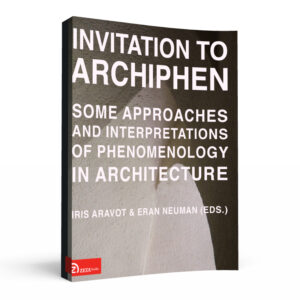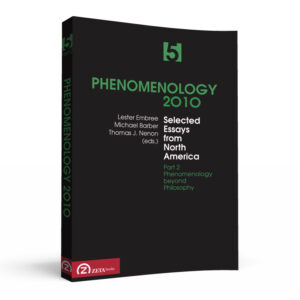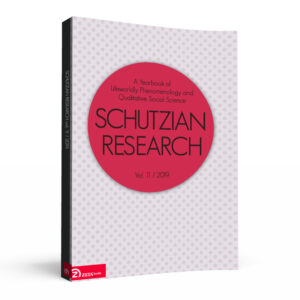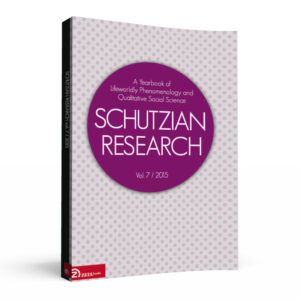Schutzian Research, Volume 14 / 2022
TABLE OF CONTENTS
Michael BARBER, Introduction
Abstract: This volume of Schutzian Research grew out of a desire by the editorial board to celebrate the Fortieth Anniversary of the Society for Phenomenology and the Human Sciences. The first three papers represent reflections on the Society from those who have long and often substantial involvement with it. We also invited contributors to submit papers that exhibit the diversity and multidisciplinarity that has typified the Society from its inception.
Hisashi NASU, Personal Memories of and Expectation for the Society for Phenomenology and the Human Sciences
Abstract: The co-moderators of the Roundtable session of 2021 annual meeting of the Society for Phenomenology and the Human Sciences (SPHS) kindly gave me several topics for my presentation, and I would like to deal with four topics among them in this essay. I first attended the SPHS annual meeting in 1994, which was held at Seattle from September 29 to October 1, in accordance with invitation of George Psathas. At that time, I took a sabbatical from March of 1994 to April of 1995, stayed in Boston, and belonged to Boston University as a visiting scholar with his generous support.
Steven CROWELL, In Search of George Psathas
Abstract: This essay begins with some of the author’s recollections of George Psathas during their collaboration in organizing and administering the annual Schutz Lecture. These lead to reflections on the role of phenomenology in social scientific method, as represented, in different ways, by Schutz, Goffman, and Garfinkel. Examining a tension between cognitivist and pragmatic approaches to the normative orders in which social life takes place, George Psathas identifies a distinctive role for phenomenology, one that the author endorses as an essential moment of “idiosyncrasy” in scientific inquiry.
David SEAMON, Reflections on the Early SPHS
Abstract: I came to learn of the Society for Phenomenology and the Human Sciences (SPHS) through my dissertation advisor Anne Buttimer, then a Geography professor at Clark University in Worcester, Massachusetts. At the 1980 Ottawa meeting of the Society for Phenomenology and Existential Philosophy (SPEP), Buttimer had participated in a special session on “place and space,” organized by Clark University Philosophy professor Steven Skousgaard. After that 1980 event, Buttimer suggested I organize another session on the topic, this time sponsored by SPHS, which she explained had recently been formed and would hold its first annual meeting in 1981 in conjunction with SPEP. Entitled “phenomenologies of place,” that SPHS session took place at Northwestern University, in Evanston, Illinois. As I remember, session participants were Buttimer, psychologist Bernd Jager, and philosophers Joseph Grange and Robert Mugerauer.
Alexis GROS, Methodological Individualism in Alfred Schutz’s Work: Scope and Limits
Abstract: In this paper, I intend to clarify Alfred Schutz’s complex relationship to methodological individualism (MI), showing that he defends a “hermeneutic,” “weak” and “partial” variant of this approach. I will do so by focusing mainly on his reception of Max Weber, given the latter’s centrality in the MI paradigm.. In order to achieve my objective, I will proceed in three steps. First (1), to avoid misunderstandings, I will provide an updated definition of MI, distinguishing it from ontological and normative individualism and giving an overview of its different variants. Second (2), I will systematically reconstruct Schutz’s convergences with Weber’s “hermeneutic” MI. Finally (3), I will develop the thesis of the “partiality” and “weakness” of Schutz’s MI with the help of recent literature on his work.
Tuba YILMAZ, Strangeness: Analyzing Otherness as a Form of Relationship Through the Older Brother and Schutz’s Thoughts
Abstract: Being a stranger has become a global definition due to the migrations caused by the wars and unemployment in the Middle East and the perceptions of Islamophobia and Islamic terrorism prevailing in the West. In Alfred Schutz’s essay The Stranger, he deals with this issue in terms of orientation and adaptation problems and gives information about this concept by making use of different examples. Mahir Guven also rehandles the concept of the stranger in his novel Older Brother (Grand Frère) by building on the story of an immigrant family. Older Brother is a contemporary and political novel. It tells of two brothers in their thirties who grew up in a multicultural family (Turkish mother, Kurdish father, and two brothers; one is a half-Syrian taxi driver, and the other is a half-French surgical nurse) in the suburbs of Paris. The novel interrogates concepts such as nationality, belonging, family ties, culture, identity, immigration, and foreignness through the eyes of the characters. Starting from the problem of being a stranger, which has become a big problem with the effect of increasing immigration movements, we will try to examine the novel Older Brother from Alfred Schutz’s point of view approach to this matter.
J. Leavitt PEARL, I Can’t: Acute Sexual Impotence and the Flesh
Abstract: Since Husserl’s phenomenological analyses of the living body (Leib) in Ideas II, the subjective experience of the body, what later French thinkers will name the flesh, has been particularly marked by its capacity for action—its potency. This privileging of the acting flesh, the potent organ, is echoed throughout the subsequent phenomenological tradition. For this tradition, from de Biran and Husserl, to Merleau-Ponty and Henry, the flesh is distinguished from the mere body (Körper) by its unique capacity to act. For the later French tradition to be flesh is to be will, and to be will is to be action. Impotence (impuissance) appears as external resistance. In the present investigation, I challenge this trajectory of the flesh through a phenomenological investigation of the unique phenomenon of acute sexual impotence. In this way, it will be shown that l’impuissance (impotence) can be located not only in the objectivity of opposition within the world, on the organic or objective body (le corps, Körper), but within the immanence of the flesh (la chair, Leib) itself. Indeed, the experience of incarnate l’impuissance provides a unique phenomenological access to the incomplete synthesis of the carnal flesh—a synthesis that remains, by phenomenological necessity, run through with ruptures and gaps that function as its constitutive excess.
Jochen DREHER, Phenomenology of the Stranger: The Relational Concept of Strangeness
Abstract: The essay presents a relational concept of the stranger parting from and at the same time going beyond Alfred Schutz’s famous and controversial conception of “The Stranger.” Not only the subjective viewpoint of the stranger entering an in-group – as in the Schutzian outline – is relevant for the construction of strangeness, but also the interactional context and the receiving in-group with its respective patterns of culture. For strangeness is a relational concept, it is only constructed in relationships of individuals and groups; it is an ascription or “label” that is activated in interaction processes. Within in- and out-group constellations, the stranger is objectified by social typification, which may be based on a de-subjectivation and reification of the respective Other. Relational strangeness refers to the diverse possibilities of the social construction of the stranger, always taking into consideration the individuals involved in in- and out-group relations.
ISSN: 2067-0621 (paperback)
ISSN: 2248-1907 (electronic)






